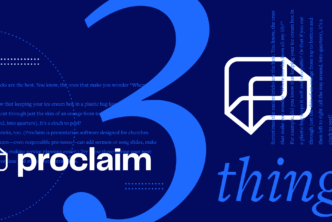At some point, every pastor will face criticism about music volume. A few preemptive steps will go a long way to prepare you for the inevitable noise complaint.
Use a dB meter to collect data
Noise complaints are usually subjective, made on feeling or impression. It’s important to measure the sound in the auditorium for both frequency and overall volume so you can respond with a scientific measurement.
The metric used to measure volume is called a decibel (dB). Some common benchmarks are:
- 0 dB: rustling leaves
- 60 dB: conversation
- 85 dB: city traffic
- 100 dB: stock earphones at maximum volume
- 120 dB: a clap of thunder
You can buy a meter to wire directly into your soundboard, but I prefer to use a free Android app called Noise Meter. (iOS users, what’s your favorite equivalent?)
If you haven’t been measuring your service volume levels, avoid making decisions based on just one week. Collect some data—learn what your normal has been before you start making changes.
Take note of acoustic changes based on the state of the room. Sound checks and rehearsals happen when the room is empty, which means the volume will run 10–15 dB louder than it will during the service, when the pews are full of people breaking up the sound.
Set a baseline & maintain it
After you’ve collected a few weeks of data, set a baseline. Decide what you want your normal to be. Communicate this to your audio technician and anyone who might be leading worship. It needs to be a range, and it needs to be flexible to make room for dynamics. Leave yourself enough room to emphasize a powerful lift without blowing eardrums—enough room to give a little more bass to Easter Sunday’s big resurrection song.
So what should your level be? That’s an excellent question, and the answer will vary wildly from facility to facility depending on size, acoustics, and similar factors. Rooms that echo a lot are going to feel louder, even when the volume measurements are milder.
Respond thoughtfully with kind questions
When you inevitably hear “It was just too loud for me,” how do you respond? I recommend gathering more information before making any statements. Ask questions like:
Did you feel it was louder than usual?
You need to know if this is a one-off concern or a more systemic complaint. You might not like the answer, but you need the information.
Which song made you uncomfortable?
Was it the volume overall, or just the guitar in the opener to “God’s Not Dead”? You could be dealing with a frequency (pitch) concern, not a volume concern. Electric guitar often runs at frequencies that can be uncomfortable for older folks. Asking for more specific information can help you understand what triggered the discomfort. It also communicates to the concerned party that you’re competent and thinking about them.
Where were you sitting?
It’s going to be louder next to the speakers. Period. Nothing you can do about it. Explain that sound dissipate throughout the room, and you need to make it audible for everyone. Suggest a different seat and you might reach a resolution without touching the levels.
Work your way gradually to, “I’m sorry to hear that. We’ll double-check the levels for next week.” Since you measure the levels and have set a baseline, you can say this without an ounce of hypocrisy.




